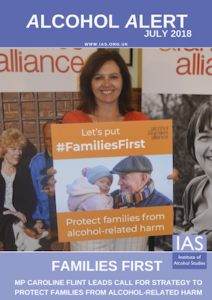In this month’s alert
Editorial – July 2018
Welcome to the July 2018 edition of Alcohol Alert, the Institute of Alcohol Studies newsletter, covering the latest updates on UK alcohol policy matters.
This month, Caroline Flint MP urges government to put Families First at a parliamentary launch. Other articles include: HM Treasury considers lifting freeze on alcohol duty; Heineken promo girls harassed on the job; US millennials most likely to suffer deaths from liver cirrhosis since the financial crash; and the Welsh Government opens a consultation on low alcohol labelling.
Please click on the article titles to read them. We hope you enjoy this edition.
COVER STORY – Caroline Flint: Let’s put Families First
Report launch urges government to enact policies that protect parents and their children from alcohol-related harms
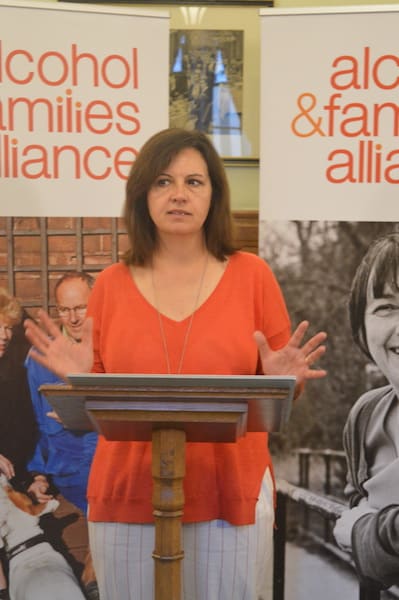
Caroline Flint addresses the audience |
03 July – There needs to be a ‘national conversation’ on alcohol harms, in order to end the stigma around alcohol misuse, according to a new report from the Alcohol and Families Alliance (AFA).
Families First examines the impact alcohol has on families and children in the UK and the gaps in support for those suffering from alcohol misuse. The parliamentary launch of the report was supported by the All Party Parliamentary Groups on Alcohol Harm (represented by Fiona Bruce MP) and on Children of Alcoholics (represented by Liam Byrne MP), as well as people with personal experience of alcohol problems.
The reception was hosted by Caroline Flint MP, who spoke of her own battle with her mother’s addiction to alcohol. She admitted that she kept her mother’s illness under wraps for more than a decade after her death because it was ‘too painful’.
‘I think back to when I was public health minister between 2005 and 2007 and before that a home office minister and in both of those jobs I had responsibility for the National Drugs Strategy – and obviously alcohol,’ she said.
‘But I would have to be honest with you that even as public health minister it was too much to ask me to talk about my own background.’
The stigma around talking openly about the effects of alcohol misuse on families is one of many issues addressed in the report, which finds that while almost 200,000 children live with at least one alcohol-dependent adult, there is very patchy provision of support, both nationally and for families affected by alcohol, and that training is needed to help professionals identify parental drinking problems and show families where to get help. Alongside this, Families First raises concerns with alcohol’s position in wider society – particularly its increased affordability and availability in recent years – and how this works against families hoping to avoid harm.
The report also found many barriers for those caring for a family member, or the child of a family member, with an alcohol use problem. Many of these carers suffer financial hardship due to their caring roles, and some – caring for another family member’s children – are not entitled to the same rights and benefits as other carers.
Families First showcases the need for government to take prompt policy action on the effects of alcohol misuse, listing 12 recommendations that would improve support from families, carers and parents, as well as help to address the wider role of alcohol in society. Among the policy demands were: to provide better training for universal service practitioners to identify parental drinking problems and signpost families to specialist support where appropriate; to increase the Carer’s Allowance to ensure carers do not suffer financial hardship; to publish evidence-based guidance on parental and family member drinking and its effect on children, including at low levels; and for the government to ‘start a national conversation’ about the country’s relationship with alcohol through a mass media campaign to challenge the stigma towards families affected by alcohol.
On the recommendations, Caroline Flint MP said that ‘they lay out a clear plan of action that needs to be considered within the upcoming Alcohol Strategy. We must put families first.’
The report was warmly received by Parliamentary Under Secretary of State for Public Health and Primary Care Steve Brine, who promised to produce a response in due course, and Shadow Health Minister Jon Ashworth, who promised to meet the AFA to discuss next steps for promoting the aims of the report.
You can listen to Caroline Flint MP speak about the Families First report in more detail below.
Alcohol duty – from freeze to thaw?
Whitehall hints at turning to duty to fill hole in nation’s finances
02 July – Ministers are understood to be considering ending the alcohol duty freeze announced in last autumn’s budget, to boost public spending and cut the deficit.
Details of these plans were leaked to the press by senior government sources in addition to plans to scrap duties on fuel. The Guardian reported that duty raising measures are ‘under serious consideration’ ahead of the next Budget as they would ease pressure on the public finances, as well as contribute to funding the £20bn pledge to fund the NHS made by Prime Minister Theresa May.
Responding to the news, WSTA Chief Executive Miles Beale disputed the existence of a freeze, noting instead that default ‘government policy is to increase levels of duty in line with RPI inflation, which currently sits at around 3.5%’.
He went on to tell the Morning Advertiser that his organisation successfully campaigned to postpone this rise in the previous Budget.
‘Recent WSTA analysis has shown that by freezing duty last time out, [Chancellor of the Exchequer] Philip Hammond actually raised revenue for the Treasury,’ he claimed, to the tune of £86m between December 2017 and April 2018.
However, HM Treasury’s own figures indicate that the freeze – which covers beer, wine, cider and spirits – already costs approximately £200m a year. This would likely nullify the sum stated by Beale over a given year, due to the uneven nature of alcohol duty.
Exchequer Secretary Robert Jenrick told parliament that based on the Office for Budget Responsibility’s (OBR) published policy costings, the Treasury estimates the cumulative loss of successive alcohol duty freezes and cuts since 2013/14 to 2018/19 to be around £4bn, ‘equal to the yearly cost of employing over 100,000 teachers’.
Heineken promo girls harassed
Adapted from EUCAM

Source: EUCAM website |
05 July – Promotional girls for Heineken in Africa are being intimidated on a large scale during their work, and they endure poor working conditions, according to an investigation commissioned by Heineken and conducted by the agency Partner Africa, following news reports in Dutch news outlet NRC and the publication of the book Bier voor Afrika (Beer for Africa).
The investigators spoke to a total of 181 women promoters, of which instances of verbal, sexual or physical harassment were mentioned by 57 interviewed in Burundi, Congo, DRC, Nigeria, Sierra Leone, Kenya, Uganda, and Mozambique. Mozambique was singled out as a hotspot for sexual harassment by customers toward promoters; all 13 thirteen cases detailing transgressions of a sexual nature were based there.
Promoters identified customers as the perpetrator in all reports of harassment, and in some instances, bar owners or managers too. The majority of harassment reported was verbal. Other forms of harassment experienced by promoters included inappropriate or unwanted physical contact by customers, unwanted comments of a sexual nature, harsh language, or feeling disrespected or humiliated by customers. This follows on from previous NRC reports of interviews with women promoters in Nigeria and with sellers in Congo who said that groping is usual when they are at work.
According to its own estimates, Heineken uses 20,000 beer promoters worldwide, 4,000 of whom are deployed in Africa. The company refuses to disclose the full investigation ‘because it contains competition-sensitive information’. But by their own account, the investigators did not come across women who are being pressured into sleeping with their managers in order to secure their job – the beer brewer discovered this practice in Congo in 2007 in another internal investigation. The investigation also rules out prostitution during work.
However, problems that came to light included the short skirts women are forced to wear in some countries, the absence of a contract and payslips, slow payment, a lack of clarity about the age of the women and unpaid overtime.
In one instance in Egypt, Heineken worked with an agency that seized the passports of female employees. These women are restricted in their freedom of movement outside working hours. This phenomenon is known as bonded labour and is considered to be a modern form of slavery. Heineken says the contract with this agency has since been terminated.
The brewer has drafted new policies to tackle the malpractices and guarantees that there will be no malpractices from now on, stating that if it is not convinced its conditions can be met in a certain market or through a sales channel, ‘we will terminate the deployment of beer promotors there with immediate effect.’ According to Heineken, this has already happened in Mozambique, where the deployment of promotional girls has been suspended.
But the malpractices at Heineken were grounds for the ASN Bank to expel the beer brewer from the sustainable investment fund. In addition, The Global Fund – one of the largest donor organisations in the world, which fights aids, tuberculosis and malaria with financial support from The Bill & Melinda Gates Foundation – has suspended its partnership with Heineken.
Is the Portman Group Fit for purpose?
Alcohol charity call out Portman Group guidelines for lacking accountability
06 July – The charity formed by the merger of Alcohol Concern and Alcohol Research UK has called for an overhaul of alcohol marketing regulation as part of the Government’s new national alcohol strategy.
Fit for purpose – an analysis of the role of the Portman Group in alcohol industry self-regulation, found inconsistencies in the industry-funded body’s decision-making processes dating back 12 years, while avoiding scrutiny over its judgements, noting that there is no recourse to appeal complaints rejected by the watchdog.
The charity also thought the Portman Group’s role in reducing alcohol-related harm to be ‘neither clear nor explicit’, and described the evidence base used to support the Panel’s complaints decisions as ‘generally narrow’.
Compliance to the Panel’s Code is voluntary, so the Portman Group’s power to govern the alcohol marketing landscape effectively depends on ‘the willingness of major retailers to co-operate by no longer selling products the Panel has ruled against.’ However, the report states that in most cases, ‘promotional activities that are found to have breached the Code will already have been active in the public domain for some time, and a campaign may even have been completed, before the judgement has been made.’
Fit for purpose concludes that ‘the system lacks clear mechanisms of accountability, meaning there is no guarantee of impartial or effective regulation’, and that ‘moving to a fully statutory arrangement would bring much more open and transparent regulation. Regulatory decisions would have to be explained and justified publicly and could be challenged on the basis of evidence.’
Irish drink-drivers face automatic ban
Adapted from the Irish Independent
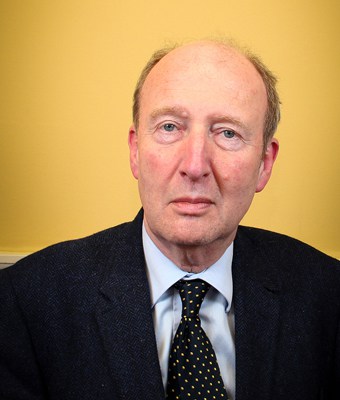
Shane Ross TD |
07 July – Drivers who get behind the wheel after just half a pint will now face an automatic ban under strict new laws.
New legislation proposed by Transport Minister Shane Ross has finally passed in the lower house of the Irish parliament (Dáil) following months of filibustering. It does not change the limits for alcohol consumption, at a blood alcohol level of 50mg for experienced drivers, but anyone found over this will now be put off the road for three months. At the moment, people found to be driving while over the limit are given a fine and three penalty points, and disqualification is only handed out as a penalty for drink-drivers found with more than 80mg of alcohol in their blood.
A number of independent members of parliament (TDs) in the rural constituencies – namely Michael and Danny Healy Rae and Tipperary TD Mattie McGrath – opposed the bill, adopting the filibustering tactic in order to stop it, which Mr Ross described as ‘irresponsible and reckless’. They claimed that it would foster rural isolation and prevent those in rural areas from being able to travel to and from work while awaiting a driving test for a full licence.
However, at a special sitting of the Dáil – attended by just 83 TDs – the bill was finally passed after a special provision invoked by Social Democrats TD Catherine Murphy, which effectively called a halt to the debate.
Mr Ross said he did not know when the bill will come into effect but said he does not expect the same delays in the Seanad (the upper house of the Irish parliament).
In addition, the legislation will also introduce strict new laws aimed at learner drivers. The limit is lower for them and professional drivers, at a blood alcohol level of 20mg. The bill grants the Irish police powers to seize unaccompanied learner drivers’ vehicles and fines of up to €2,000 for motorists who allow learner drivers to drive their vehicles unaccompanied.
The amendment to the law that deals with learner drivers is named after the Clancy family, who lost two members in a road traffic tragedy almost three years ago involving an unaccompanied learner driver. Noel Clancy, who lost his wife and daughter in the accident, said he was relieved the legislation was passed but said he was “very frustrated” at the tactics deployed by rural TDs.
‘I think I have been in the Dáil 10 or 12 times, it’s almost a second home at this stage, and it is absolutely frustrating to listen to the absolute rubbish that was spouted,’ Mr Clancy told RTÉ Radio One’s Drivetime.
Following the passage of the bill – which was met with a round of applause in the chamber – Danny Healy Rae termed it “a sad day for rural Ireland”.
However, Donna Price, founder of the Irish Road Victims’ Association, said she believes it would deter people who may have otherwise risked a drink-driving conviction from getting behind the wheel.
EHSN respond to UEFA alcohol relaxation
Public health ‘has not been considered’
16 July – In the light of news that European football’s governing body UEFA plans to relax the sale of alcohol ahead of the 2018/19 season, the European Healthy Stadia Network (EHSN) has released a letter questioning the move’s impact on the public health implications of its audience globally.
Changes to Article 36 of UEFA’s Safety and Security Regulations will allow football grounds to sell and serve alcohol at European matches in line with national and local licensing legislation.
EHSN’s statement reads:
As part of its social responsibility programme, UEFA has committed to promoting healthy and active lifestyles, and works with its associate partner European Healthy Stadia Network CIC (Healthy Stadia) to develop sports stadia as ‘health promoting settings’.
As communicated directly to UEFA’s member associations and widely reported in several media outlets, we note that after its Executive Committee meeting in Kiev on 24th May, UEFA has amended Article 36 of its Safety and Security Regulations (distribution of alcohol), in favour of: “a policy allowing (not requiring) such sale and distribution [of alcohol], but subject at all times to national and local laws”. We also note that this decision has been reached after a “thorough evaluation as to whether UEFA’s longstanding policy prohibiting the availability of alcohol at its matches should be maintained or removed”.
As an NGO working to develop sports stadia as ‘health promoting settings’, we are concerned that opinion from the field of public health has not been considered as part of this ‘thorough evaluation’ process, and have some wider reaching concerns with the proposed relaxation of Article 36.
Whilst we acknowledge that the vast majority of football fans attending UEFA matches choosing to drink alcohol will do so responsibly, it is appropriate to summarise some of the short and long-term consequences of alcohol consumption on health and wellbeing, and suitable counter measures that can be adopted to minimise negative impact of this policy change.
EHSN offers a set of ‘harm reduction’ measures that should be coordinated by UEFA in advance of the 2018-19 season for those countries and clubs affected by the change in policy:
- Stopping sale of alcohol at the end of half-time.
- Agreement on what maximum strength alcohol may be sold at UEFA matches – we suggest restricting this to drinks with alcohol content of no more than 3%.
- Agreement on maximum number of alcoholic drinks to be purchased at UEFA matches per visit to drinks concession – we suggest no more than 2 drinks per person, per visit.
- UEFA led campaign promoting responsible consumption of alcohol at all food and beverage (F&B) concessions selling alcohol, with specific advice on rehydration through water.
- Availability of free, clean drinking water for rehydration upon request at all UEFA matches.
- Up to date training of all F&B serving staff (full-time and part-time) to recognise signs of overconsumption of alcohol and protocol on declining sale of alcohol to intoxicated fans. Additional training on supply of alcohol in line with national age-restrictions, something that varies widely across Europe.
- In-depth training of stewards and security staff on overconsumption of alcohol by fans within the stadium, intervention and ejection protocol, with particular focus on egress flows and dispersal away from the stadium in public areas.
- Stewards should also be aware that some people with disabilities have slurred speech, or have limited mobility that stewards may mistake for someone who is drunk. Stewards and concession staff should therefore receive disability awareness training to ensure they do not jump to conclusions.
You can read the full statement titled Serving of Alcohol at UEFA matches: Official Response from European Healthy Stadia Network here.
Leading French wine producers protest health logos
Vintners pen open letter to government criticising warning label plans
16 July – 64 leading French wine producers have written an open letter to the French government, criticising plans to introduce standardised health-warning logos to alcohol labels.
The standardised red, white, and black pictograms, which aim to clearly inform consumers against drinking whilst pregnant or underage, have been described by producers as risking doing ‘damage [to] “the soul of France”’, The Telegraph reports.
The proposal builds on France’s current regulations, which mandate the presence of a written or pictorial pregnancy warning, but do not specify design of the message. According to The Telegraph, under this voluntary system, the average size of pregnancy logos is currently 3 mm – half that of a standard pencil.
The producers cite concerns that increasing logo diameter to a standardised 20mm – smaller than that of a £1 coin – threatens to make their product ‘criminal’. The vintners also question the impact of this proposal on exported labels, despite the fact that export markets would be unlikely to require that imports meet French regulations, Drinks Business reports.
Health Minister, Agnès Buzyn, announced these plans as the National Institute for Health and Medical Research reports that quarter of women in France continue to drink during pregnancy. Drinking in pregnancy has been a recent concern in France; the original regulation was introduced in 2007, after several cases of foetal alcohol syndrome resulted in a lawsuit against the French Government for failing to inform consumers.
The proposed changes have been welcomed by paediatrician Dr Denis Lamblin, who campaigns that such health messages should not be ‘camouflaged’.
Cirrhosis deaths crisis among US millennials
Researchers find unexpected 10% annual rise in cases annually post-recession
18 July – Deaths from cirrhosis rose in all but one state in the United States of America (USA) between 1999–2016, according to new research published in the British Medical Journal.
The observational study also found that mortality due to cirrhosis began increasing from 2009, with the biggest increases seen among 25–34 year-olds, driven entirely by alcohol-related liver disease.
Researchers from the University of Michigan and VA Ann Arbor Healthcare System analysed death certificates compiled by the Centers for Disease Control and Prevention’s online data for epidemiologic research project over the 17-year period, focusing on deaths caused by cirrhosis, with the aim of determining which groups of people had been most impacted across the country.
From 1999 to 2016 annual deaths from cirrhosis increased 65%, to 34,174, affecting all states except Maryland. Annual deaths from hepatocellular carcinoma doubled to 11,073. In the seven years directly following the recession, the researchers found that people aged 25–34 years experienced the highest average annual increase in cirrhosis related mortality (10.5%), driven entirely by alcohol related liver disease.
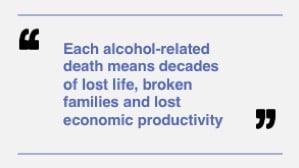
The age distribution of deaths surprised liver specialists, who had, according to Science Daily, been making gains in fighting hepatitis C, ‘a major liver threat often seen in Baby Boomers’. One such expert, Elliot B Tapper MD (University of Michigan Division of Gastroenterology and Hepatology), believes the data matches a ‘disturbing shift in demographics’ that he has witnessed among the patients with liver failure he treats at Michigan Medicine, that has seen increasing numbers of young people in communities across the country drinking themselves to death.
‘Each alcohol-related death means decades of lost life, broken families and lost economic productivity,’ says Tapper. ‘In addition, medical care of those dying from cirrhosis costs billions of dollars.’
When speculating the causes behind the rapid rise in alcohol-related liver disease deaths, Tapper suspects a connection between alcohol use and unemployment associated with the global financial crisis. ‘But more research is needed,’ he says.
In the meantime, ‘these data underscore gaps in care and opportunities for prevention’ say the authors, who suggest strategies such as increasing the level of resources available to screen for and treat alcohol use disorders, paying attention to the possibility of using state level policy instruments such as increased taxes on alcohol, and minimum pricing, as mandated in Scotland.
Responsible drinking messages absent from social media
New marketing study finds venues drive underage online activity
18 July – A new paper led by researchers from the universities in Bath and Birmingham shows that the social media accounts of drinking venues are influential in young adults planning and documenting of drinking occasions, with hardly any attention paid to low-risk or responsible drinking messaging.
Funded by Alcohol Research UK, All night long: Social media marketing to young people by alcohol brands and venues is the first to conduct a systematic analysis of online marketing aimed at young people in the UK by selected venues as well as alcohol brands, investigating young people’s engagement and the implications for the current UK advertising Codes of Practice.
The report analysed 419 social media marketing posts by five alcohol brands and three venues on Twitter, Facebook and Instagram posted during two consecutive weeks in May and June 2016. The researchers also carried out interviews with the participants from 11 focus groups made up of 53 young people aged above and below 18 from the south-west of England.
It found that people aged between 18 and 25 years were more likely to follow local venues on social media than major alcohol brands, and that those venues were more likely to associated images of social success, sexual attractiveness and intoxication with alcohol, activities that would breach the Advertising Standards Authority’s Broadcast Codes of Practice. The report also saw that none of those venues (and fewer than 2% of posts by brands) referred to responsible drinking.
For brands, the level of social marketing activity varied depending on whether they were running specific promotions. The most common social media marketing practices linked products to sponsored events, or events, or ‘real world tie-ins’. For venues, the most common posts presented information about events and the availability of products.
The study concluded that the speed and volume of social media activity at the very local level poses serious challenges for regulation, especially in a ‘reactive’ system whereby complaints are adjudicated over a number of weeks.
Professor Isabelle Szmigin, from the University of Birmingham and co-author of the study, said: ‘We need to recognise that social media is markedly different to other forms of advertising, it is more focused in its targeting and more transient.
‘The traditional form of reactive complaint process is no longer sufficient.’
Study reveals gender differences in drinker harms
Call for focus on context-specific interventions to reduce alcohol-related harm
23 July – Programmes that target preventing alcohol harm towards women should focus on heavy or harmful drinkers in close proximity relationships. This was the main finding of an international meta-analysis of the harm from known others’ drinking by relationship proximity to the harmful drinker and gender, published in the journal Alcoholism – Clinical & Experimental Research.
This study analysed the links between having a close proximity relationship with a harmful drinker and the likelihood of experiencing harms from acquaintances’ drinking habits in 10 countries – Australia, New Zealand, Nigeria, Chile, USA, The People’s Democratic Republic of Laos, Thailand, Vietnam, India, and Sri Lanka. The data were collected via two large projects: the WHO/Thai Health Collaborative Study of Alcohol’s Harms to Others, and the Alcohol’s Harm to Others: Multinational Cultural Contexts and Policy Implications (GENAHTO) project. Seven types of harm experienced because of the drinking of known people in the previous 12 months were investigated, which ranged from having less money for household expenses, to physical harm, to being forced pressured to have sex.
There was a gendered difference in alcohol-related harms experienced – women were more likely than men to report a close male as the most harmful drinker in their life; these women were also more likely than women with an extended most harmful drinker to report each type of harm, and one or more harms, from others’ drinking. Men, on the other hand, were more likely to report a male in their extended social circle as the most harmful drinker in their life.
There was no difference in odds of reporting most types of harm from others’ drinking between men with an extended most harmful drinker and men with a close most harmful drinker. The authors suggested that the primary focus of efforts to prevent alcohol-related harm to women should be on heavy or harmful drinkers in close-proximity relationships; for preventing harm to men, a broader approach is needed. They further noted that their findings can help to develop context- and gender-specific interventions to reduce alcohol-related harms to others.
Alcohol interlocks piloted in Durham
First county in the UK to do so
24 July – Devices which breath-test drivers before their cars start are to be trialled in County Durham, in a bid to crack down on drink-driving.
Durham Constabulary will be the first in the UK to pilot alcohol interlocks which immobilise a vehicle if the driver is over the legal alcohol limit. They will be offered to repeat offenders on a voluntary basis as part of the police force’s Checkpoint programme – in some instances where drinking is a factor, offenders will be asked to agree to have an alcohol interlock fitted to their car as part of a ‘behaviour contract’. They will also be offered free of charge to anyone in the force’s area who wants one.
The cost of the trial will be absorbed by US-based manufacturer, Smart Start, whose staff visited Durham Constabulary to train the police in installation and management of the interlocks.
A suspected 285 road accidents have been linked to alcohol in County Durham in the last three years, averaging one every 3–4 days.
Detective Inspector Andy Crowe, leading the initiative, said: ‘This really is an innovative project which is a first for the UK and will hopefully help us identify and deal with potential drink drivers before they even get behind the wheel.
‘A number of offenders in our area have a problematic relationship with alcohol and we hope, as part of a wider programme, this will help them address their issues.’
Police, Crime and Victims’ Commissioner for Durham, Ron Hogg, said: ‘The misuse of alcohol puts a massive strain on our emergency services and the financial burden alone is estimated to be in the region of £11bn, not to mention the potentially devastating consequences for the families of those killed or injured in road traffic accidents caused by alcohol.
‘The UK Government has assessed the evidence from other countries and concluded that alcohol interlocks are effective and cost-effective in reducing reoffending. Yet there is no legislation which would allow police forces in the UK to pilot these devices through the courts.
‘Until there is a change in national policy, Durham Constabulary will use these on a voluntary basis for repeat offenders, those who have a history of problems with alcohol or anyone who thinks could benefit from the system to sign up through the Checkpoint programme.’
Wales consults on low alcohol labelling
Government invites public opinion on how to describe beverages
25 July – The Welsh Government has announced an open consultation on low alcohol drinks labelling, seeking views on the descriptions used on the packaging of beverages sporting a low alcohol content by volume (ABV).
The government invites members to consider whether:
- the existing regulations should be replaced with guidance
- the alcohol by volume (ABV) content of low alcohol drinks should be lower than 1.2%
- the current descriptors ‘alcohol free’, ‘non-alcoholic’ and ‘dealcoholised’ should be changed
- an additional descriptor for alcoholic drinks which are higher than 1.2% ABV should be introduced
Submissions can made online via their website form, by e-mail to tobaccopolicy@gov.wales, or by post to the ‘Risk Behaviours (Tobacco, Alcohol and Gambling)’ team in the Public Health Division of the Welsh Government’s Cardiff offices.
The deadline for the consultation is 19 September 2018.
Alcohol treatment in the prison system: fit for purpose?
Adapted from Alcohol Policy UK
27 July – A new Ministry of Justice (MoJ) analysis raises further questions over alcohol treatment options for prisoners. The MoJ Data Lab report [pdf] assesses the outcomes of 435 offenders engaged with the Forward Trust Alcohol Dependence Treatment Programme (ADTP) but found no improvement in outcomes compared with a comparison group.
Previous reports have raised questions over the availability and research of alcohol interventions in the criminal justice system and likely impacts on re-offending. The Forward Trust (formerly RAPt and Blue Sky) who deliver the ADTP programme in a number of prisons however claim it is still effective in reducing re-offending and that the original ‘Rapt’ 12 step treatment programme showed a 65% reduction in crime.
The latest analysis indicates 37% of those participating in the ADTP programme re-offended, not statistically different from the 36% rate of re-offending in the comparison group. The Forward Trust states ‘technical challenges in adequately matching the characteristics of our programme clients with a control group of offenders’, namely that the level of alcohol dependence in the comparison group could not be established. It also states other work has shown re-offending rates of 58% for those with drug or alcohol problems and that offenders in the comparison group were highly likely to have received ‘some form of alcohol intervention’ in custody.
The latest national figures for those receiving treatment in secure settings show 7,663 people had alcohol only treatment in 2016–17, a decrease from 8,551 the previous year. Nearly half (28,958) of all prisoners engaging in substance treatment cited problematic alcohol with the majority primarily receiving opiate treatment.
The MoJ release comes in the same month that the HM Chief Inspector of Prisons for England and Wales Annual Report 2017–18 surveyed prisoners on their views of alcohol treatment services. It found that a significant proportion of prisoners (42% men and 45% women) said they had not been helped with their alcohol problem while in prison. A significantly higher proportion of women than men reported alcohol problems (24% of women compared with 18% of men, see table) on arrival at prison.

Alcohol prisoner survey responses by sex |
You can read the full article – titled Alcohol treatment in the prison system: fit for purpose? – on the Alcohol Policy UK website.
ALCOHOL SNAPSHOT – Underage drinkers are more likely to be sexually active
Among a number of positive public health trends in recent years has been a decline in the number of teenage pregnancies, which are often (though not always) unwanted. Teenage conception rates are 50% lower today in England and Wales than in 2007. Existing evidence suggests that early alcohol use is associated with earlier sexual activity, lower levels of condom use and having more sexual partners. As a result, when the British Pregnancy Advisory Service (BPAS) – a charity that provides abortion, contraception and advice services – sought to explore the causes of the decline in teen pregnancy, they looked at drinking as a contributory factor.
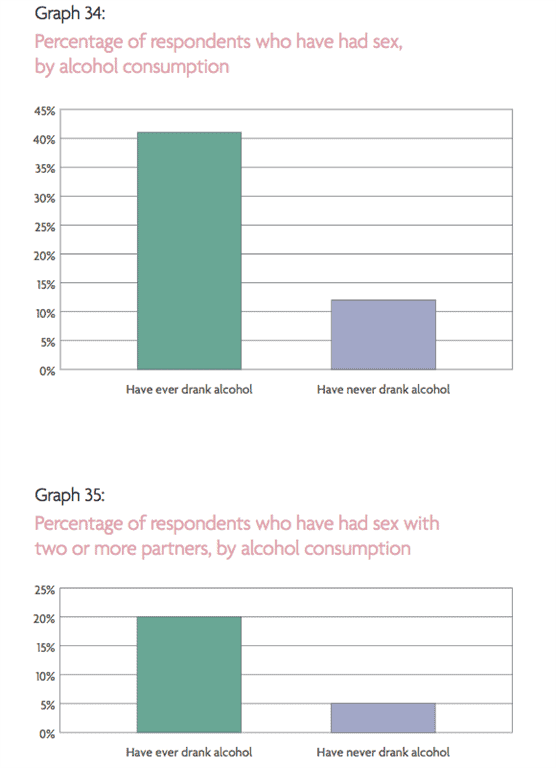
|
The charts above are taken from the report Social media, SRE, and sensible drinking, published earlier this month by the BPAS, and funded by alcohol industry body the Portman Group. They represent some of the findings from a survey of 1,004 16-18 year olds. The charts show that young people that tried alcohol are more likely to have sex: over 40% have done so, compared to just over 10% of those that have never drunk. They also show that young drinkers are more likely to have had multiple partners.
It is important to emphasise that these results show only a correlation between non-drinking and lower sexual activity. While the report provides some qualitative evidence that some young people see intoxication as causing risky sexual behaviour, the possibility that other characteristics may account for both drinking and sexual activity must be considered. Nevertheless, the evidence is at least somewhat suggestive that lower drinking among young people may have contributed to reduced rates of teenage pregnancy.
Podcast
Our monthly podcast features interviews with experts from across the sector.
Gambling industry harms and parallels with the alcohol world
Will Prochaska –
Coalition to End Gambling Ads

